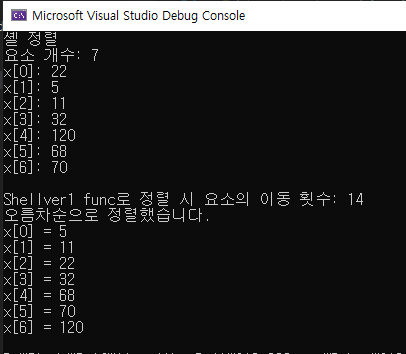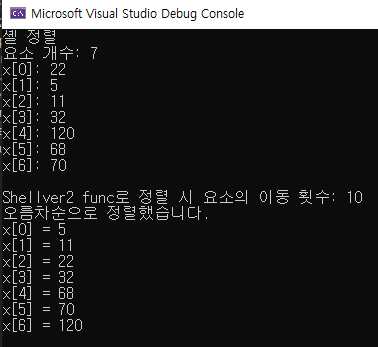Vienna
6일차 본문
오늘은 C#을 좀 많이 공부해서 조금밖에 못할 것 같다.
하지만 오늘도 화이팅
1. 실습_6-6 셸 정렬 버전1
#define _CRT_SECURE_NO_WARNINGS
#include <stdio.h>
#include <stdlib.h>
void Shell(int a[], int n) {
int i, j, h;
for (h = n / 2; h > 0; h /= 2) {
for (i = h; i < n; i++) {
int tmp = a[i];
for (j = i - h; j >= 0 && a[j] > tmp; j -= h)
a[j + h] = a[j];
a[j + h] = tmp;
}
}
}
int main() {
int i, nx;
int* x;
puts("셸 정렬");
printf("요소 개수: ");
scanf("%d", &nx);
x = (int*)calloc(nx, sizeof(int));
for (i = 0; i < nx; i++) {
printf("x[%d]: ", i);
scanf("%d", &x[i]);
}
Shell(x, nx);
puts("오름차순으로 정렬했습니다.");
for (i = 0; i < nx; i++)
printf("x[%d] = %d\n", i, x[i]);
free(x);
return 0;
}
2. 실습_6-7 셸 정렬 버전2
#define _CRT_SECURE_NO_WARNINGS
#include <stdio.h>
#include <stdlib.h>
void Shell(int a[], int n) {
int i, j, h;
for (h = 1; h < n / 9; h = h * 3 + 1);
for (; h > 0; h /= 3) {
for (i = h; i < n; i++) {
int tmp = a[i];
for (j = i - h; j >= 0 && a[j] > tmp; j -= h)
a[j + h] = a[j];
a[j + h] = tmp;
}
}
}
int main() {
int i, nx;
int* x;
puts("셸 정렬");
printf("요소 개수: ");
scanf("%d", &nx);
x = (int*)calloc(nx, sizeof(int));
for (i = 0; i < nx; i++) {
printf("x[%d]: ", i);
scanf("%d", &x[i]);
}
Shell(x, nx);
puts("오름차순으로 정렬했습니다.");
for (i = 0; i < nx; i++)
printf("x[%d] = %d\n", i, x[i]);
free(x);
return 0;
}
3. 연습문제 Q12
요소의 이동 횟수를 계산할 수 있도록 버전 1과 버전 2를 수정한 프로그램을 작성하세요. 여러 가지 배열을 입력하고 프로그램을 실행하며 이동 횟수를 비교해 보세요.
내 답변:
#define _CRT_SECURE_NO_WARNINGS
#include <stdio.h>
#include <stdlib.h>
void Shellver1(int a[], int n) {
int i, j, h, move=0;
for (h = n / 2; h > 0; h /= 2) {
for (i = h; i < n; i++) {
int tmp = a[i];
for (j = i - h; j >= 0 && a[j] > tmp; j -= h){
a[j + h] = a[j];
move++;
}
a[j + h] = tmp;
move++;
}
}
printf("\nShellver1 func로 정렬 시 요소의 이동 횟수: %d\n", move);
}
void Shellver2(int a[], int n) {
int i, j, h, move=0;
for (h = 1; h < n / 9; h = h * 3 + 1);
for (; h > 0; h /= 3) {
for (i = h; i < n; i++) {
int tmp = a[i];
for (j = i - h; j >= 0 && a[j] > tmp; j -= h){
a[j + h] = a[j];
move++;
}
a[j + h] = tmp;
move++;
}
}
printf("\nShellver2 func로 정렬 시 요소의 이동 횟수: %d\n", move);
}
int main() {
int i, nx;
int* x;
puts("셸 정렬");
printf("요소 개수: ");
scanf("%d", &nx);
x = (int*)calloc(nx, sizeof(int));
for (i = 0; i < nx; i++) {
printf("x[%d]: ", i);
scanf("%d", &x[i]);
}
// Shellver1(x, nx);
Shellver2(x, nx);
puts("오름차순으로 정렬했습니다.");
for (i = 0; i < nx; i++)
printf("x[%d] = %d\n", i, x[i]);
free(x);
return 0;
}

정답:
한 프로젝트 내에서 한 번에 풀라는 뜻은 아니었나보다. 나도 요소의 이동 횟수를 변수로(답지에는 count, 내가 쓴 거에선 move) 리턴할까 했는데 그럼 main 함수에서 코드가 길어지기도 하고, 나는 하나의 프로젝트로 합쳐놨으니 어떤 함수가 가동되었는지 콘솔창만 봐서는 알 수가 없어 void로 처리했다. 그리고 함수 내에서 출력하는 것으로 처리했다.
///*--- 셸 정렬(버전 1 : shell1.c를 수정) ---*/
//int shell(int a[], int n)
//{
// int i, j, h;
// int count = 0;
//
// for (h = n / 2; h > 0; h /= 2)
// for (i = h; i < n; i++) {
// int tmp = a[i];
// for (j = i - h; j >= 0 && a[j] > tmp; j -= h) {
// a[j + h] = a[j];
// count++;
// }
// a[j + h] = tmp;
// count++;
// }
// return count;
//}///*--- 셸 정렬(버전 2 : shell2.c를 수정) ---*/
//int shell(int a[], int n)
//{
// int i, j, h;
// int count = 0;
//
// for (h = 1; h < n / 9; h = h * 3 + 1)
// ;
//
// for (; h > 0; h /= 3)
// for (i = h; i < n; i++) {
// int tmp = a[i];
// for (j = i - h; j >= 0 && a[j] > tmp; j -= h) {
// a[j + h] = a[j];
// count++;
// }
// a[j + h] = tmp;
// count++;
// }
// return count;
//}둘다 main 함수는 빼고 가져왔다.
4. 실습_6-8 퀵정렬(1)
#define _CRT_SECURE_NO_WARNINGS
#include <stdio.h>
#include <stdlib.h>
#define swap(type,x,y) do{type t=x;x=y;y=t;}while(0)
void partition(int a[], int n) {
int i;
int pl = 0;
int pr = n - 1;
int x = a[n / 2]; // 피벗
do {
while (a[pl] < x) pl++;
while (a[pr] > x) pr--;
for (i = pr; a[i] > x; i--);
if (pl <= pr) {
swap(int, a[pl], a[pr]);
pl++;
pr--;
}
} while (pl <= pr);
printf("피벗의 값은 %d입니다.\n", x);
printf("피벗 이하의 그룹\n");
for (i = 0; i < pl; i++)
printf("%d ", a[i]);
putchar('\n');
if (pl > pr + 1) {
printf("피벗과 일치하는 그룹\n");
for (i = pr + 1; i <= pl-1; i++)
printf("%d ", a[i]);
putchar('\n');
}
printf("피벗 이상의 그룹\n");
for (i = pr + 1; i < n; i++)
printf("%d ", a[i]);
putchar('\n');
}
int main() {
int i, nx;
int* x;
puts("배열을 나눕니다.");
printf("요소 개수: ");
scanf("%d", &nx);
x = (int*)calloc(nx, sizeof(int));
for (i = 0; i < nx; i++) {
printf("x[%d]: ", i);
scanf("%d", &x[i]);
}
partition(x, nx);
free(x);
return 0;
}재밌다... 그리고 이거 생각해낸 사람은 진짜 머리가 좋은 것 같다. 설명 읽다가 감탄사가 절로 나왔다.
'알고리즘 문제 풀이 > Do It! 자료구조와 함께 배우는 알고리즘 입문 C언어 편' 카테고리의 다른 글
| 06-8) 힙 정렬 (0) | 2023.05.13 |
|---|---|
| 7일차 (0) | 2021.11.26 |
| 5일차 (5) (0) | 2021.11.24 |
| 5일차 (4) (0) | 2021.11.23 |
| 5일차 (3) (0) | 2021.11.23 |
Comments


